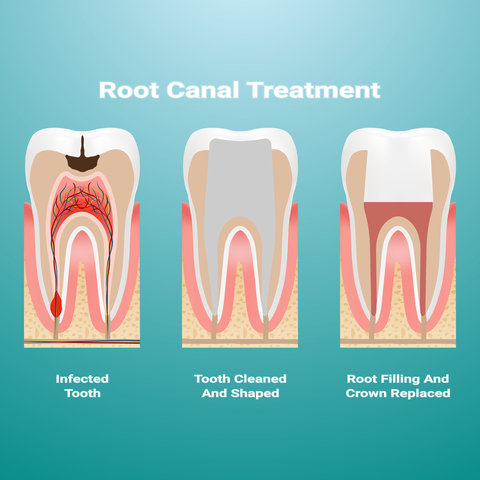21 Root Canal Questions Answered
You’re not alone if you are confused about root canal therapy.
It is a debated topic and one that needs to be answered by a professional.
A root canal is a procedure in which a dentist removes the infected pulp of a tooth.
What are the most commonly asked questions relating to root canals?
It turns out there are 21 sort-after questions, and the answers and insights are below.
Jump to Contents
- What is Root Canal Therapy?
- Is it Safe?
- How is Treatment Done?
- Will it Save My Tooth?
- Front Teeth: Are My Odds Better?
- Is Root Canal Therapy Painful?
- Is There Any Discomfort Afterwards?
- When Should You See the Dentist?
- When Root Canal Therapy Can’t be Done
- How Many Visits to the Dentist will it Take?
- Do You have a Sensitive Tooth?
- Does Treatment Fix a Loose Tooth?
- Can I Save a Loose Tooth?
- Root Canal Therapy: Before and After
- Possible Complications: What are they?
- Potential Side Effects
- Do you have Symptoms?
- Leaving a Tooth Untreated
- How Long does it Take to Recover?
- New Treatment Options Available
What is Root Canal Therapy
Root canal treatment restores teeth that are decayed, severely infected, or weakened by injury.
The procedure removes both the infected tissue and the nerve of the affected tooth so that the infection doesn’t spread and the pain stops.
Is Root Canal Therapy Safe?
You may have read that if you undergo root canal therapy, your chances of contracting a severe illness or disease go up.
This isn’t true.
Although research carried out 100 years ago claimed that such a link existed, it has since been debunked.
There is no scientifically-proven link between root canal therapy and disease.
How is Treatment Done?
Before the procedure begins, your dentist will numb the treatment area with a local anaesthetic.
If you’re worried or anxious, nitrous oxide or another form of sedation are useful.
Once you are ready, the dentist uses special instruments to remove the infected tooth pulp and nerve.
After cleaning out and disinfecting the interior of your tooth, they fill it with a special gel and apply a temporary crown.
At your next appointment, the dentist will replace the temporary crown with a customised permanent one.
Will it Save my Tooth?
If your tooth has become infected by a fracture or decay, root canal therapy can save it from becoming abscessed or dying.
If the latter happens, your tooth will need to be removed.
Intervention means the difference between saving it and having to extract it.
More information by various dentists and endodontists can be found here.
Front Teeth: Are My Odds Better?
Root canal therapy is more straightforward on front teeth because unlike molars; they usually have only one root.
The canal is also generally both straight, wide, and easier to access.
Depending on how much of your tooth structure is left, you may not even need a crown, unlike treated molars that need protection from biting forces.
Is it Painful?
You’ve likely heard the saying about an unpleasant event being as “fun as having a root canal.”
It arises from the belief that root canal therapy is painful.
This may have been the case at one time, but modern dental technology ensures that the procedure is quick and comfortable, most of the time.
When Root Canal Therapy Can’t be Done?
Occasionally a root canal procedure is not enough to save your tooth.
This can occur when calcium deposits have made the canal too narrow for the dentist to access the end of the root.
In this instance, your dentist may perform an apicoectomy or root-end resection.
The gum tissue is opened to reveal the bone and remove the end of the root and any infected tissue.
How Many Visits to the Dentist will it Take?
While advancements in dental technology have allowed root canal therapy to be completed in one visit, it can take up to three if you have curved roots or a complicated infection.
Every patient is different, and some root canals need many visits for a successful outcome.
Does Treatment Fix a Loose Tooth?
Root canal therapy can fix a loose tooth by removing the infection and preventing it from spreading into the surrounding tissues.
If trauma loosened the tooth, a root canal can clear space to implant an artificial root.
This ‘root’ holds a crown in place that protects the tooth from further damage.
You might continue to experience some tenderness and sensitivity until the swelling has gone away.
Over-the-counter or prescription medications should elevate discomfort.
But, if the pain is severe or lasts more than a few days, call your dentist.
Possible Complications: What are they?
In most cases, root canal therapy goes off without a hitch, but there is always a risk of complications such as:
- Bacteria being missed and causing pain as it grows
- Undetected cracks in the root of the tooth that allow an infection to set in
- Problems with the inner seal, allowing bacteria back into the tooth root
If you experience intense or persistent pain after a root canal, notify your dentist right away.
- Infection from missed bacteria
- Extruding root canal filling
- Cysts around the area where work was done
- Scar tissue around the site
Should you notice or feel anything unusual after treatment, contact your dentist.
If you would like more information about the potential side effects, here is a good post by wellness mama that covers both sides of the coin.
Do You Have Symptoms?
If symptoms resume after treatment, it can be a sign that the root canal treatment has failed.
Examples include:
- Pain
- Soreness when biting or chewing
- Gum swelling in the treatment area.
If an X-ray examination confirms there is an infection present in your tooth, re-treatment or even extraction should be considered.
Leaving a Tooth Untreated?
If an infected tooth is left untreated, the pulp tissue will gradually die, resulting in symptoms like pain and swelling.
Over time, bacteria can travel from the infected tooth into the gum and jaw tissue.
This creates a painful abscess and even inflammation throughout the whole body.
Risks for severe health conditions such as a stroke and heart disease are also likely.
How Long does it Take to Recover?
In the majority of cases, you can return to work soon after having a root canal, even when you elect to use nitrous oxide to calm you during the procedure.
Neither the local anaesthetic nor nitrous oxide will cause drowsiness or impaired motor function.
Depending on the type of work you do, you might want to take the day off so that you can rest and give your body a chance to start healing.
Success Rate
When done correctly, root canal therapy should have a success rate of over 95%.
When root canals fail, it is usually due to the following:
- Missed or incompleted treated canals
- Post-treatment bacterial leakage
- Cracked roots
- Tooth decay
If these happen, your dentist will have to re-treat the tooth.
New Treatment Options Available
Yes, most definitely.
Technology has improved dramatically.
Laser treatment has recently come onto the market and has to date, a 100% success rate.
Meaning, I haven’t had any failures since using this new root canal therapy technology with her patients.
We will be discussing this innovation in a future post.
So stay tuned!
Conclusion
Maybe you have been told you need a root canal treatment, but don’t know what’s involved or perhaps even have a question that needs answering.
I believe you should get all the facts first before deciding whether root canal therapy is right for you.
All questions relating to these procedures are essential, even the ones that you feel are simple.
So don’t be afraid to ask, it may well save you a lot of pain and money in the long run.
Do you have a question for Dr V about root canals?
By Dr. V
Created at December 05, 2017, Updated at January 25, 2025














